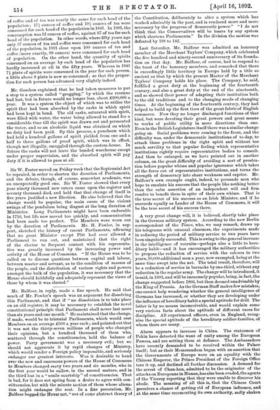Sir W. Foster moved on Friday week that the Septennial
Act be repealed, in order to shorten the duration of Parliaments, and the debate, though, of course, somewhat academic, was an unexpectedly good one. Sir W. Foster showed that every year ninety thousand new voters came upon the register and seventy thousand died, and held that that change of itself in five years justified a new Election. He also believed that the change would be popular, the main cause of the violent swings of the pendulum being disgust at the long duration of Ministries. Long Parliaments might have been endurable in 1716, but life now moved too quickly, and communication had been made too perfect. The Members were worn out by the duration of Parliaments. Mr. H. Fowler, in sup- port, sketched the history of recent Parliaments, affirming that no great Minister except Pitt had ever allowed a Parliament to run out, and maintained that the right of the elector to frequent contact with his representa- tive was greatly increased by the increasing power and activity of the House of Commons. "If the House was to be called on to discuss questions between capital and labour, between master and servant, as to the condition of masses of the people, and the distribution of various rights and powers amongst the bulk of the population, it was necessary that the House should faithfully and adequately represent the views of those by whom it was elected."
































 Previous page
Previous page